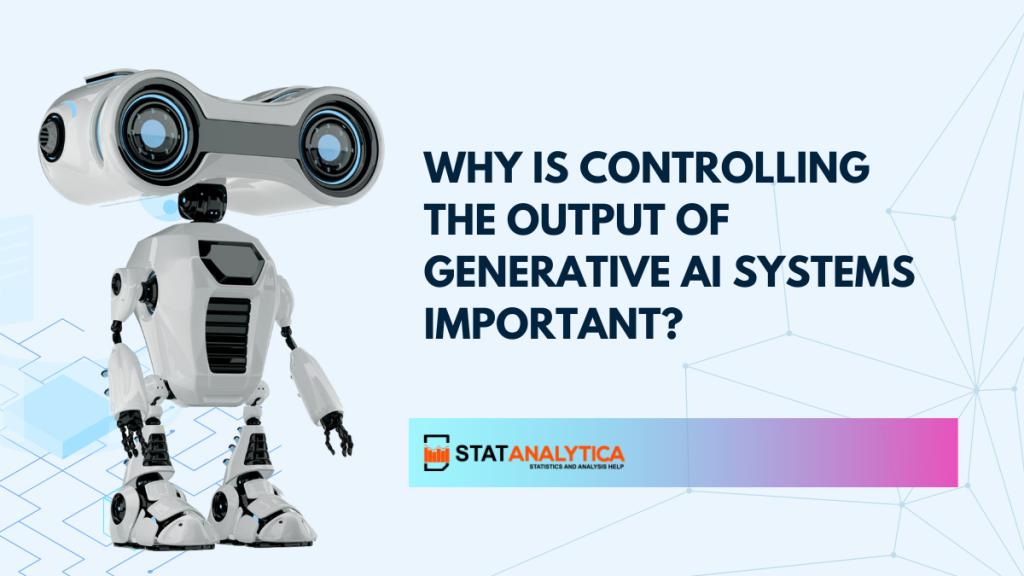In today’s digital age, artificial intelligence (AI) has become a powerful tool that impacts many aspects of our lives. Generative AI has become popular because it can make new things like images, videos, and text. While generative AI holds great promise for innovation, there are important reasons why controlling its output is crucial. This blog explores why is controlling the output of generative AI systems important. 
Overview: Generative AI
Table of Contents
Generative AI refers to a class of algorithms that are trained on large datasets to generate new content that resembles the original data. These systems work by learning patterns and structures from existing examples, enabling them to create new, similar content autonomously.
The Potential of Generative AI
Generative AI has numerous applications across various fields:
- Creative Industries: It can generate art, music, and literature.
- Medical Research: It aids in drug discovery and medical image analysis.
- Entertainment: Used for creating special effects in movies and games.
- Education: Helps in creating interactive learning materials.
What Are The Risks Associated with Uncontrolled Output?
While generative AI has transformative potential, there are significant risks if its output is not properly controlled:
Misinformation and Fake Content
- Generative AI can be used to create realistic but false information, such as fake news articles or forged documents.
- Example: Creating fake videos of public figures saying things they never said.
Privacy Concerns
- AI systems trained on personal data can generate sensitive information, compromising individuals’ privacy.
- Example: Generating realistic faces of people who do not exist but resemble real individuals.
Ethical Issues
- There are ethical implications when AI generates content that perpetuates stereotypes, biases, or harmful ideologies.
- Example: Generating biased text or images that reinforce societal prejudices.
Why Do We Need To Control AI?
- Ethical Considerations: AI systems can perpetuate biases or ethical dilemmas if not properly controlled, affecting societal fairness and justice.
- Safety and Security: Uncontrolled AI could lead to unintended consequences, such as cybersecurity vulnerabilities or safety risks in autonomous systems.
- Privacy Protection: AI often processes large amounts of personal data, requirIng strict controls to prevent unauthorized access or misuse.
- Reliability and Accuracy: Ensuring AI systems produce accurate and reliable results is essential, especially in critical applications like healthcare or finance.
- Legal and Regulatory Compliance: AI must comply with laws and regulations regarding data privacy, discrimination, and accountability to avoid legal issues.
- Trustworthiness: Controlling AI builds trust among users and stakeholders, promoting acceptance and adoption of AI technologies.
- Mitigating Risks: Proactive control measures can mitigate risks associated with AI failures or misuse, safeguarding individuals and organizations.
- Promoting Responsible Innovation: Controlled AI fosters responsible innovation by encouraging developers to consider ethical implications and societal impacts.
- Transparency and Accountability: Control mechanisms ensure transparency in AI decision-making processes, enabling accountability for outcomes.
- Human Oversight: Ultimately, humans should retain control over AI systems to make ethical decisions and intervene when necessary, ensuring alignment with human values and goals.
Why Is Controlling The Output Of Generative AI Systems Important?
Preventing Misinformation
- Example: Generative AI can create convincing fake news articles or videos, potentially misleading the public.
Protecting Privacy
- Example: AI-generated faces could resemble real individuals, raising concerns about unauthorized use of personal likeness.
Ensuring Ethical Standards
- Example: AI may unintentionally perpetuate biases in text or images, influencing societal perceptions negatively.
Maintaining Accuracy
- Example: In medical diagnostics, AI-generated results must be precise to support accurate patient assessments.
Promoting Security
- Example: AI systems can inadvertently generate vulnerabilities in software or systems, posing cybersecurity risks.
Upholding Legal Compliance
- Example: AI-generated content must adhere to copyright and intellectual property laws to avoid legal disputes.
Fostering Trust
- Example: Transparent AI controls build confidence among users and stakeholders in its ethical use and reliability.
Guiding Ethical Use
- Example: Implementing clear guidelines ensures AI is used responsibly across industries like healthcare and finance.
What Are The Benefits Of Using The Generative AI Hub For Developers?
- Centralized Access: Developers can access a wide range of pre-trained models, datasets, and tools in one place, streamlining development processes.
- Accelerated Prototyping: Ready-to-use models allow rapid prototyping and experimentation without starting from scratch, speeding up development cycles.
- Scalability: Models on the hub are often designed to scale, allowing applications to handle larger datasets or higher demand seamlessly.
- Community and Support: Developers can benefit from a supportive community, sharing insights, tips, and best practices for implementing generative AI effectively.
- Customization: Hub resources often include frameworks and APIs that developers can tailor to specific project requirements, enhancing flexibility.
- Quality Assurance: Access to verified models and datasets reduces the risk of errors and improves the quality and reliability of AI-powered applications.
- Innovation: By leveraging cutting-edge AI advancements available on the hub, developers can innovate and create novel solutions in various domains.
- Cost-Effectiveness: Utilizing existing models and tools from the hub can lower development costs compared to building and training models from scratch.
- Compliance and Security: Many hubs prioritize security and compliance, ensuring that models meet industry standards and data privacy regulations.
- Continuous Updates: Hubs often update with the latest research and advancements in AI, allowing developers to stay current and integrate new features seamlessly.
Techniques for Controlling Generative AI Output
Various methods and techniques can be employed to control generative AI systems effectively:
| Technique | Description |
| Adversarial Training | Training AI to recognize and reject outputs that are misleading or harmful. |
| Human Oversight | Involving humans to review and approve AI-generated content. |
| Ethical Guidelines | Establishing principles and guidelines for the ethical use of AI. |
Real-World Applications
Several organizations and industries are actively implementing controls on generative AI:
- Social Media Platforms: Using AI to detect and moderate fake accounts and content.
- Healthcare: Regulating AI tools used in medical diagnostics to ensure accuracy and patient privacy.
- Education: Implementing AI-generated content in classrooms under strict educational guidelines.
Conclusion
Why is controlling the output of generative AI systems important? Generative AI holds immense potential to innovate and transform industries, but its uncontrolled use poses significant risks to society.
By implementing effective controls and regulations, we can harness the benefits of AI while mitigating its potential harms. It is crucial for policymakers, researchers, and developers to work together to establish guidelines that promote responsible use of generative AI, ensuring a safer and more ethical future for all.
In conclusion, controlling the output of generative AI systems is not just important—it’s essential for safeguarding our privacy, maintaining accuracy, and upholding ethical standards in the digital age.
By understanding these concepts, students and future leaders can contribute to shaping a responsible AI-driven world.


